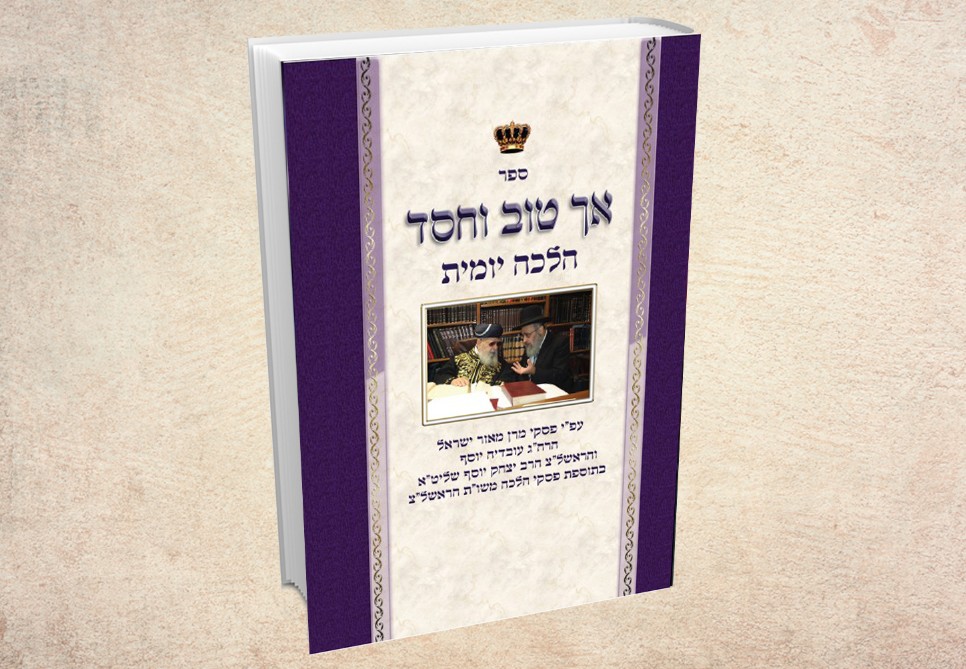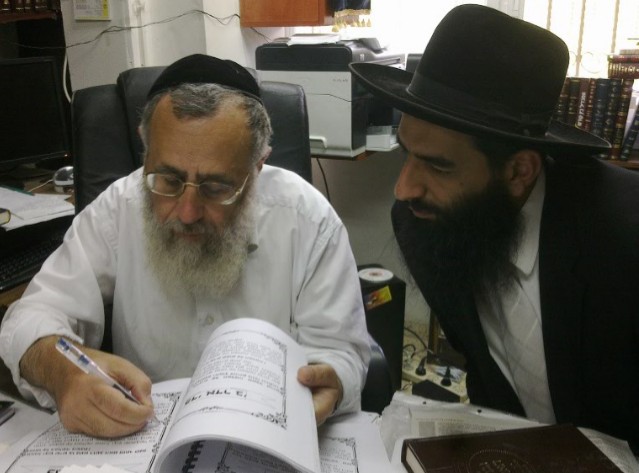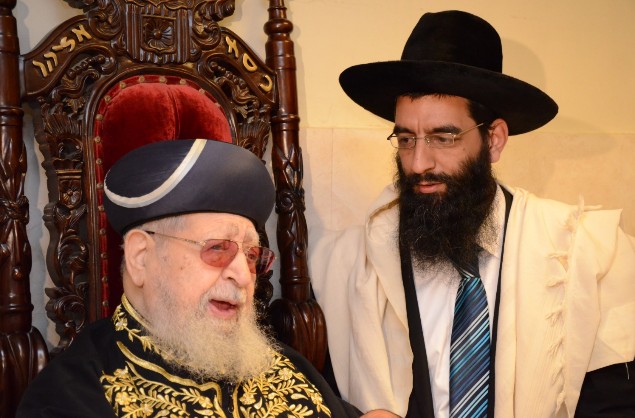"A Man Called Me to Say Daily Halacha Study Saved Him from an Attack"
The Daily Halacha book, which offers concise and simple daily halachic teachings, has sold tens of thousands of copies in recent years. An intriguing interview with the book's editor, Rabbi Avraham Cohen.

Tens of thousands of people across the country and the world began their day today (27th of Tevet) with the question: "May one send a minor to immerse vessels?" They also learned the answer: "It is not permitted to send a minor, below the age of mitzvot, to immerse vessels, but if they immerse in front of an adult, it is allowed." They also discussed the issue: "Is there any permission to use an unimmersed vessel one time?" and received the answer: "There is no such permission at all, even if the use is temporary."
These concise and summarized halachot were learned by the multitudes from the Daily Halacha book—edited by Rabbi Avraham Cohen, head of the Beit Din for Monetary Matters 'Halacha and Law' in Ashkelon. This book is unique in that it offers daily halachot divided according to the days of the year, with each date having a specific halacha, and where possible, it also connects to the time and occasion during which it is learned. Incidentally, this is not Rabbi Cohen's only book, as he has also authored the series 'Ach Tov VeChesed' on the four parts of the Shulchan Aruch and other books.
 The Cover of 'The Daily Halacha Book'
The Cover of 'The Daily Halacha Book'When we spoke with Rabbi Cohen's students, they told us about the great resemblance between him and his teacher, Rabbi Ovadia Yosef z"l, reflected in his meticulousness in halacha and his vast knowledge. "As part of this," the students say, "the rabbi gives a major halachic lesson every evening from six to eight, for more than ten years." According to them, the only time (!) the lesson did not take place during all that time was on the day of the passing of Rabbi Ovadia Yosef, because all the class members participated in the funeral.
"I Wanted to Present Halacha Accurately"
We sought to speak with Rabbi Cohen himself, and at the beginning of our conversation, he told us about the special relationship he was privileged to have with the Rishon LeZion, Rabbi Yitzchak Yosef, who, as he emphasizes, all the halachic rulings in the book are based on his rulings and have passed his review.
"About 12 years ago, in a very rare occurrence, I met a Jew who took me to Rabbi Yitzchak Yosef's home. It was on a winter Friday evening Shabbat. The rabbi warmly opened his door to us, and since then, our souls have been connected. Every month we would go to pray with him at the synagogue and observe his conduct during prayer. Blessed is Hashem that over the years and through the rabbi's tutelage, many halachic nuances in practical life became clear to me, and I soon composed a halachic compilation containing several views of poskim. Following this compilation, Rabbi Yosef called me and explained that to avoid confusion in halacha, one should only bring Rabbi Ovadia's rulings and not confuse learners with other opinions that are not practical."
 Rabbi Yitzchak Yosef Reviewing the Daily Halacha Book
Rabbi Yitzchak Yosef Reviewing the Daily Halacha BookThis led Rabbi Cohen to write the 'Daily Halacha' book. "I chose the shortest and most precise way—to bring short and concise halachot. Whenever a halachic doubt arose and Rabbi Ovadia had not addressed it in his books, or his words were unclear to me, I turned to consult his son, Rabbi Yitzchak, who guided me on what to write and what to omit."
And where did the idea of dividing the halachot by the days of the year come from?
"The idea was born over 500 years ago," he smiles, "by the author of the Shulchan Aruch, Rabbi Yosef Karo, who instructed that one should study halacha every day. Personally, as I serve as a community rabbi, I would strive every morning at the synagogue to find current halachot to inform the public and convey them after the prayer. After some thought, I concluded that it would be more convenient to produce an organized book with halachot presented in clear and straightforward language. The book is arranged according to the order of the Shulchan Aruch, but whenever there were current halachot or special events and holidays—we included the halachot relevant to that holiday, emphasizing innovations from the Rishon LeZion in his books and orally. I made sure not to repeat halachot that had already been learned. Because the goal is ultimately to innovate and add knowledge."
When did the first book come out?
"The book was first published eight years ago, and even then, Rabbi Yitzchak Yosef told me that he visited his father who blessed the idea. When I myself had the privilege to enter the inner sanctuary—the rabbi Ovadia showered blessings on me, especially upon hearing that the book sold tens of thousands of copies, and all his blessings were about meriting the public."

Ultimately, Rabbi Cohen notes that the book is intended for anyone seeking order in the study and practical application of halacha, mainly following the rulings of the great leader of the generation, Maran Rabbi Ovadia Yosef z"l. "The language is clear and suitable for everyone, from children and women to Torah scholars, and hence our audience is so diverse," he explains.
Halacha Learning Saved Lives
Since the books were published, Rabbi Cohen notes that they have received very warm and encouraging feedback from learners. "I have heard from many readers who mentioned that due to daily distractions, they always wanted to receive a clear and sharp halachic ruling, without doubts and disputes. The book indeed provided them with the perfect answer, and thank God, we heard from readers who shared that they keep the book in their tefillin bag (in the pocket edition), in the car, at the office, and even by their bedside."
The rabbi also shares that they received phone calls from well-known and large community rabbis who spoke about members of their congregations for whom study in the book was their primary, and even sole, halachic learning.

But the most touching story is undoubtedly the following: "A few years ago, a man called us crying, saying he had studied the importance of washing after meals (mayim acharonim) in the daily halacha, and indeed that day during the lunch meal he insisted on keeping this practice and, because of it, missed the bus. Only later did he discover that it was a bus in which an attack occurred, and because of the washing, his life was saved."
Rabbi Cohen adds in conclusion: "Every year, Torah supporters from across the country turn to us, and in return for a donation for the printing of the books, one can dedicate halacha learning for any purpose they need, and they receive a book as a gift for each dedication. This way, we merit to spread Torah and the merit of learning is dedicated to the benefit of the dedicators."
As he adds, most of the people choosing to dedicate halacha do so for various events, such as birthdays, anniversaries, or in memory of someone, like observing a Yahrzeit. Some also dedicate for the elevation of the soul of a rabbi they feel connected to. In this way, they merit to add many merits to the world of Torah and halacha."

